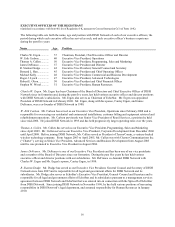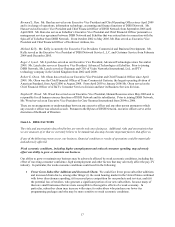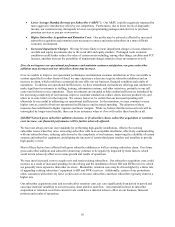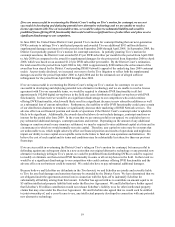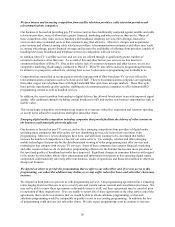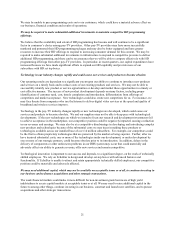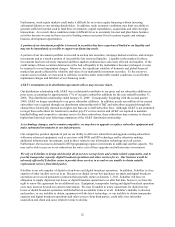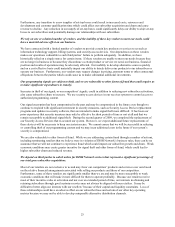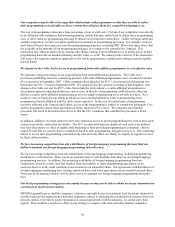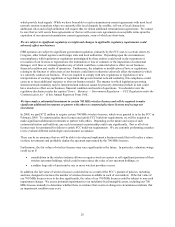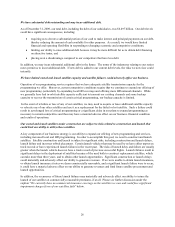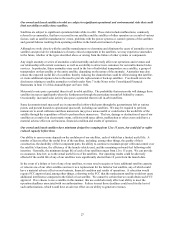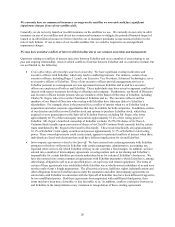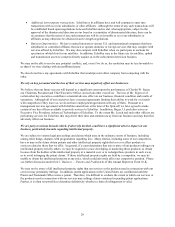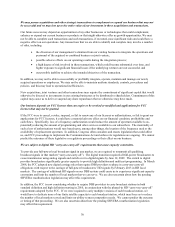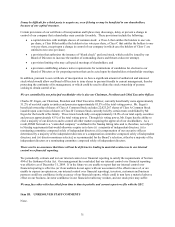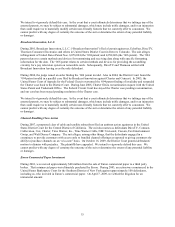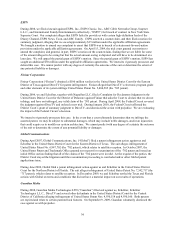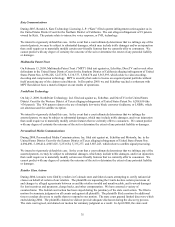Dish Network 2009 Annual Report Download - page 35
Download and view the complete annual report
Please find page 35 of the 2009 Dish Network annual report below. You can navigate through the pages in the report by either clicking on the pages listed below, or by using the keyword search tool below to find specific information within the annual report. 25
which provide local signals. While we have been able to reach retransmission consent agreements with most local
network stations in markets where we currently offer local channels by satellite, roll-out of local channels in
additional cities and in high definition will require that we obtain additional retransmission agreements. We cannot
be sure that we will secure these agreements or that we will secure new agreements on acceptable terms upon the
expiration of our current retransmission consent agreements, some of which are short-term.
We are subject to significant regulatory oversight and changes in applicable regulatory requirements could
adversely affect our business.
DBS operators are subject to significant government regulation, primarily by the FCC and, to a certain extent, by
Congress, other federal agencies and foreign, state and local authorities. Depending upon the circumstances,
noncompliance with legislation or regulations promulgated by these entities could result in the suspension or
revocation of our licenses or registrations, the termination or loss of contracts or the imposition of contractual
damages, civil fines or criminal penalties any of which could have a material adverse effect on our business,
financial condition and results of operations. Furthermore, the adoption or modification of laws or regulations
relating to the Internet or other areas of our business could limit or otherwise adversely affect the manner in which
we currently conduct our business. If we are required to comply with new regulations or legislation or new
interpretations of existing regulations or legislation that govern Internet network neutrality, this compliance could
cause us to incur additional expenses or alter our business model. The manner in which legislation governing
Internet network neutrality may be interpreted and enforced cannot be precisely determined which in turn could
have an adverse effect on our business, financial condition and results of operations. You should review the
regulatory disclosures under the caption “Item 1. Business — Government Regulation — FCC Regulation under the
Communication Act” of this Annual Report on Form 10-K.
We have made a substantial investment in certain 700 MHz wireless licenses and will be required to make
significant additional investments or partner with others to commercialize these licenses and recoup our
investment.
In 2008, we paid $712 million to acquire certain 700 MHz wireless licenses, which were granted to us by the FCC in
February 2009. To commercialize these licenses and satisfy FCC build-out requirements, we will be required to
make significant additional investments or partner with others. Depending on the nature and scope of such
commercialization and build-out, any such investment or partnership could vary significantly. Part or all of our
licenses may be terminated for failure to satisfy FCC build-out requirements. We are currently performing a market
test to evaluate different technologies and consumer acceptance.
There can be no assurance that we will be able to develop and implement a business model that will realize a return
on these investments and profitably deploy the spectrum represented by the 700 MHz licenses.
Furthermore, the fair values of wireless licenses may vary significantly in the future. In particular, valuation swings
could occur if:
x consolidation in the wireless industry allows or requires wireless carriers to sell significant portions of their
wireless spectrum holdings, which could in turn reduce the value of our spectrum holdings; or
x a sudden large sale of spectrum by one or more wireless providers occurs.
In addition, the fair value of wireless licenses could decline as a result of the FCC’s pursuit of policies, including
auctions, designed to increase the number of wireless licenses available in each of our markets. If the fair value of
our 700 MHz licenses were to decline significantly, the value of our 700 MHz licenses could be subject to non-cash
impairment charges. We assess potential impairments to our indefinite-lived intangible assets, including our 700
MHz licenses annually to determine whether there is evidence that events or changes in circumstances indicate that
an impairment condition may exist.



